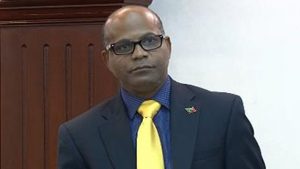
Lindsay Grant
The Eastern Caribbean Supreme Court has ordered St Kitts and Nevis tourism minister, Lindsay Grant, to pay election consulting fees owed to BuzzMaker, an international political consulting firm that has worked on hundreds of high profile political campaigns across the Caribbean and the world.
In 2009, as political leader of the People’s Action Movement (PAM), an unregistered political party in St Kitts and Nevis, Grant entered into an agreement with BuzzMaker to provide political consulting services in the run-up to the 2010 general elections but failed to pay for the services rendered.
Buzzmaker invoiced Grant for services rendered during the period July 2009 through December 2009 for a total of US$28,841.20. Grant paid a total of US$18,235, the last payment being on November 14, 2011.
Buzzmaker therefore sought judgment against Grant in the outstanding sum of US$10,606.20 plus interest in accordance with the terms of the agreement at a rate of 5% for every 15 calendar days the outstanding sum remains unpaid.
BuzzMaker’s attorneys successfully argued that Grant was liable for the debts incurred and the court agreed. Master Fidela Corbin Lincoln struck out Grant’s defence, paving the way for BuzzMaker to apply for a summary judgment against the former PAM leader.
BuzzMaker CEO Matthew McMillan remarked, “When you sign a contract and provide services, you deserve to be paid, no matter how powerful the client may be. This decision paves the way for our company to not only receive payment but also gives hope to anyone else that has found themselves in a similar predicament with powerful forces. Agreements deserve to be honoured and work deserves to be compensated, no matter how powerful the client may be.”
In its decision, the court considered and ruled on a number of points of law, including the enforcement of contracts with unincorporated associations; the liability of individuals who expressly or impliedly authorise such contracts; and the requirement to plead and prove foreign law.
